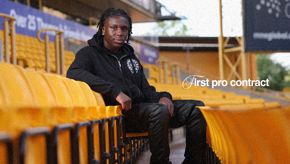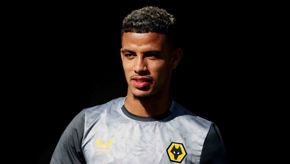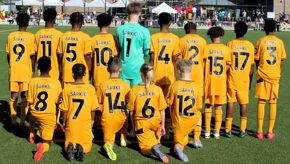Working on a daily basis with the Academy’s schoolboy age prospects and pre-scholars, Elliot makes sure the young players are as fit as possible when they return to the pitch after injury.
“When injuries occur, it’s my job to look after them at that first stage,” Elliot said. “I diagnose the injury and get them on a programme which will help their strength and conditioning and help them to return to play.
“I look after all of the players who are on day releases from their schools, working with those players throughout the week and managing them before their matches. I also work with the under-16s on matchdays as well, covering them on a matchday, which is currently on a weekday evening as they’re playing in the floodlit cup.
“I also assist on the under-18s programme, usually if another member of the physio team has quite a number of players to deal with, I can step in and help.”
During the run up to a matchday, Elliot’s role is mainly focused on prepping the players and making sure if any of the youngsters picked up an injury, they are reassessed in advance of the match to determine their availability for the game.
“Maybe the player has had a knock in the week, in that case we give them a check over to make sure they’re all fine and it’s nothing that’s going to get worse during the game.
“We make sure the players who are injured are not just saying they are fine for the game, because kids are very keen to play and sometimes they will push through the pain. At their age we have to explain to them that if they have to miss a game it’s not the end of the world – because they sometimes think it is.
“In these cases, we go through our usual tests, asks them questions, get pain scores off them where they rate the pain if they are in any, and, depending on the area, you go through each of the wide-ranging assessments.
“We also make sure they have the strength in that area which they usually have. For example, if they have a lower limb injury, we test whether they can hop, squat, do functional movements, but it’s all based around the player. From those assessments you can then determine whether they’re fine and not in any pain or are still in discomfort and might make it worse by playing.
“You then have to make the decision for them whether they need to be pulled out of the game. A lot of the time, the kids don’t understand what you’re doing, and they’ll rebel against that if you don’t explain it.
“We want these players to have long careers and missing a game when they are 14 or 15 is not going to affect them when they go to sign a professional contract – they need to think about the full picture.
“If you explain to them that missing the game is in their best interest and you’re not doing it to be harsh, they’ll be a bit annoyed, but they’ll be a bit more accepting of it and they’ll come to you and tell you they have a knock rather than hiding it and playing trough injury.”
Working with such wide-ranging ages of players means Elliot needs to know the differences between the types of injuries the players may receive, as well as growth related issues which may occur.
He explained: “For a nine-year-old, the type of injuries they get vary massively because the impact and the forces they produce they are playing are a lot less than the older age groups.
“At under-9s you might get a bit of a bump or a sprain and because they’re kids their bones aren’t as strong, and you need to be aware of growth plate issues.
“When they’re younger, it might just be an impact thing, when they’re 13/14 it might be growth related issues, then 15/16 it’s usually muscular related injuries, bigger impact injuries in matches because of the greater forces involved in tackles.
“You don’t get many big injuries under 11-year-old, it’s usually bumps on the head, scrapes and scratches – very rarely fractures. It’s as the players get older that the injuries tend to become more severe.
“Take an under-9 for example, they maybe weigh 20kgs and they’re quite light, then you have a 90kg centre-back tackling you when you’re an under-16, so that impact of a tackle varies massively on the outcomes.”
Elliot has only been with the Academy since November but is enjoying his time at the club, where he has settled into the team seamlessly.
“To get into the role, it was just about planning and taking the right steps to get through A-Levels and university and once you’re in the career, taking the opportunities you are given, trying to really learn and build experience from those around you.
“I’ve always had an interest in sport and football, and the opportunity to work in sport was something that appealed to me. Over the past few years I’ve been working on getting opportunities in football full-time which I’ve managed to do here at Wolves this season.
“I started at Wolves at the start of November and I’m really enjoying it, the team’s been very supportive and helpful going through it and all the staff have been welcoming.
“I heard good things about Wolves before I came from other people about what it’s like working at the Academy here and everyone’s been really nice and now I’ve settled in and I can now kick on.”












